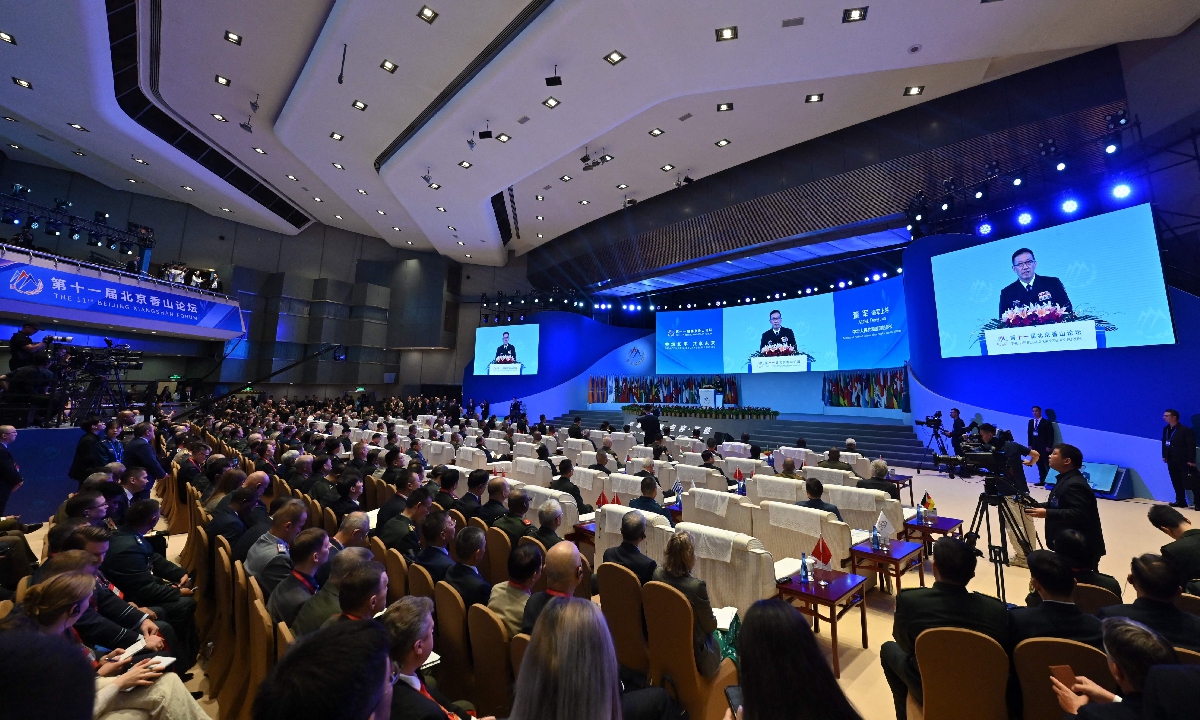
Chinese Defense Minister Dong Jun delivers a keynote speech during the opening ceremony of the 11th Beijing Xiangshan Forum at the Beijing International Convention Center in Beijing on September 13, 2024. Photo: VCG
The 11th Beijing Xiangshan Forum entered its second day on Friday with an official opening ceremony highlighted by a congratulatory letter from Chinese President Xi Jinping and a keynote speech by Chinese Defense Minister Dong Jun, as the keyword "peace" became the dominant theme of the event.
In his congratulatory letter, Xi pointed out that in the face of global changes of a magnitude not seen in a century and the expectations of people around the world for security and stability, China has been practicing the Global Security Initiative, continuously consolidating consensus among all parties, promoting the elimination of the root causes of international conflicts, improving global security governance and making unremitting efforts to build a world of lasting peace and universal security.
He expressed the hope that the current forum will continue to uphold the spirit of equality, openness, inclusiveness and mutual learning; foster broad consensus and deepen mutual trust; and make new and greater contributions to collectively addressing global security challenges and promoting the building of a human community with a shared future.
Dong said in the keynote speech that in the face of the changes of a magnitude not seen in a century, we must embrace mutual respect and sincerity, seek common ground while reserving differences, foster an open and inclusive environment, and achieve win-win cooperation and mutual success, collectively exploring a long-term path for harmonious coexistence.
Within an inseparable security community, we should share responsibilities, pursue common development, promote security through unity and mutual assistance, and seek a new security approach based on the greatest common denominator rather than the interests of small groups, said the Chinese defense minister in the speech on Friday.
Facing turmoil and conflict, we must maintain our confidence in political solutions, uphold an objective and fair stance, and adopt a holistic approach to addressing both symptoms and root causes, Dong said, calling for the accumulation of positive strength for peace and stability and the common advocation for a multipolar world characterized by equality and order.
The Chinese military firmly practices the Global Security Initiative and is willing to join hands with armed forces from all countries to build a new type of security partnership, advance pragmatic and open military cooperation, enhance security governance in emerging fields, and jointly provide safeguards for high-quality development, so as to make new and greater contributions to building a community with a shared future for mankind and to maintaining world peace and security together, Dong said.
Positive atmosphereThe security and defense forum being held in Beijing from Thursday to Saturday has been well received by participants from different countries, which find themselves supporting the ideas of the China-proposed Global Security Initiative, as the forum provides a positive atmosphere to discuss common challenges.
Lye Liang Fook, a senior fellow at the ISEAS-Yusof Ishak Institute from Singapore, told the Global Times at the forum that he was impressed by Dong's speech, as the Chinese defense minister emphasized the importance for countries in the region to collaborate based on their own national interests.
Lye noted that Dong did not address specific disputes in his speech, and his message was instead about focusing on the bigger picture. While existing disputes do exist, responsible countries should manage them and work to keep tensions low. This approach would open up more opportunities for cooperation based on common interests, of which there are many, Lye said.
"Hopefully the world is coming together more and agrees on more things in order to be able to tackle common challenges, and we need common solutions, and we need to work together. And I think global initiatives are really what is needed to do that," Lampros Stergioulas, UNESCO Chair in AI and Data Science for Society and a professor of Data Science at The Hague University of Applied Sciences, the Netherlands, told the Global Times at the forum.
I Gusti Agung Wesaka Puja, Executive Director of the ASEAN Institute for Peace and Reconciliation and a former permanent representative of Indonesia to the UN, said he sensed how China is trying to contribute to peace, not just with its neighboring countries, but globally.
"From my observations, this forum plays a crucial role in fostering dialogue, which is fundamental for building understanding and mutual trust. Dialogue and mutual understanding are, I believe, the essence of peace. From what I observed, the communication at this forum has been very positive, creating a vibrant and creative atmosphere. During this forum, discussions are very open, which is crucial for ensuring that no aspect is overlooked," Puja told the Global Times.
Adeel Jamaluddin Khan, visiting professor of the National Defense University of Pakistan, noted that the Global Security Initiative is inclusive to the developing world. "For us in the Middle East and in South Asia, like I am from Pakistan, it is very relevant, it is important to us, whereas if you compare it with the rest of the security forums, they discuss the issues of the Western world alone."
Over 1,800 guests are attending the forum, including official representatives from more than 100 countries and international organizations, as well as experts, scholars, and observers from various nations.




